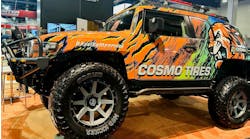With apologies to Bob Barker and Drew Carey, the Price is Wrong, not Right. I’m referring to consumer tire prices, which have been increasing rapidly, and regularly, for the last four years.
From 2007 through 2010, average passenger and light truck tire prices rose 22% and 24%, respectively. That doesn’t even include this year.
Those increases coincided with skyrocketing raw material costs. They weren’t always easy to pass on because consumers were not used to paying such high prices for what they often perceived as a commodity item.
Those “4 for $99” deals didn’t help. But after years of underpriced tires, the increases were welcome. At least grudgingly, consumers seemed to understand why. Perhaps all the press about the sizable tariffs on consumer tire imports from China helped.
Tire pricing can be a loss leader in the aftermarket. Back in 1993, Tire Kingdom in Orlando, Fla., was selling a P155/80R13 for $5.95! At the time, retail tire dealers in Orlando were paying anywhere from $18 to $22 for that size, which means the retail “markup” was as much as minus 270%! They didn’t make it up in volume.
From the manufacturers’ perspective, however, there are no loss leaders, unless they want to dump a bunch of tires in order to increase existing market share. They have to make money, and when their costs go up, it’s only logical and fair for their tire prices to go up, too.
Is there a limit to how much they can raise prices? I think there is, and that limit is upon us. Just look at the signs.
Outwardly, tire manufacturers are offering sweet deals to consumers through their dealers, such as “$160 off Goodyear tires,” or “up to an $80 mail-in rebate on selected Hankook tires.” Michelin North America Inc. says consumers can get $70 back with the purchase of four new Michelin brand tires.
Behind the scenes, a number of manufacturers are reducing prices, even on popular tire lines.
National tire retailers are using television to get their discounts across to the masses. Mike Odell, CEO and president of Pep Boys—Manny, Moe & Jack, says tire sales have been soft.
In order to combat that, here’s what the automotive parts chain was offering via TV advertising in October.
1. Buy 1 tire for as low as $29.99.
2. Buy 2 installed tires and get a free express oil change.
3. Buy 3 installed tires and get a 4th tire free (after mail-in rebate).
As you might expect, there were restrictions to the offers (listed in fine print at the bottom of the screen). The $29.99 price only applies to the Cornell brand, size P155/80R13. To get the free oil change or fourth tire free, the tire buyer was required to purchase a “tire installation package, road hazard warranty, valve stems or TPMS reseal kit.” And not all tire brands are included.
At NTB (National Tire & Battery), customers recently were able to get two tires free if they bought two, but they had to purchase the company’s “one-year alignment policy and premium installation.”
Another sign is the lack of consumer demand. The state of the economy has a great deal to do with that, but I can’t help but think high prices have a lot to do with vehicle owners putting off their tire purchases.
They will have to buy tires eventually, but consumers have leverage in the pricing game — 2/32nds-inch of leverage.
I like to think tire manufacturers will take these signs into consideration so that they don’t squeeze the independent tire dealer.
That doesn’t mean there won’t be more price increases soon. Some tire makers have to play catch-up with their competitors because they held off raising prices.
Cooper Tire & Rubber Co. recently announced a price increase effective Dec. 1. According to the company, past price increases have not fully covered raw material cost increases, so “modest” increases were necessary. The use of the term “modest” indicates to me that Cooper executives understand what is going on.
Still, by the end of the year, the average price of a consumer tire will have gone up another 10% in 2011. The average passenger tire at the retail level cost $109.71 in 2010; the average light truck tire sold for $155.79.
I can’t believe I am saying this, but for now, tire price increases need to stop.
If you have any questions or comments, please e-mail me at [email protected].




